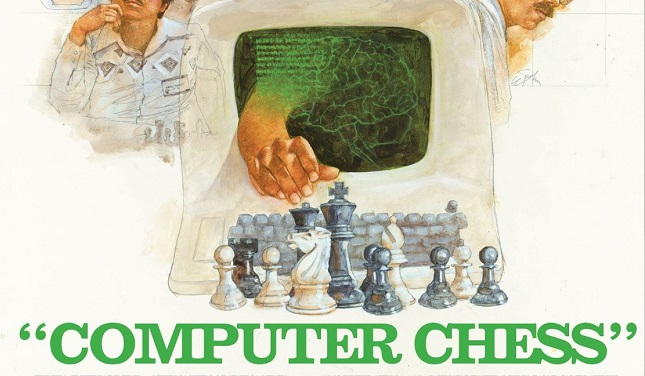
Computer Chess Review
 Computer Chess is an independent film written and directed by Andrew Bujalski that premiered at the 2013 Sundance Film Festival. The film is shot on an old analogue black and white camera in 1.33:1 ratio with a cast made up mainly of non actors. This all contributes to the distinct mocumentary style of the film.
Computer Chess is an independent film written and directed by Andrew Bujalski that premiered at the 2013 Sundance Film Festival. The film is shot on an old analogue black and white camera in 1.33:1 ratio with a cast made up mainly of non actors. This all contributes to the distinct mocumentary style of the film.
The film takes place at an early 1980’s computer chess tournament and follows the programmers as well as other visitors of the hotel. The period is faithfully represented in not only the fashion but also the computer equipment used by the teams. The film starts by following the tournament and the various teams, giving a nice insight into the problems of creating the chess programs and the period when personal computers really were taking massive leaps. However, as the film goes on, things start to get strange as the various characters intermingle with the hotel guests including swingers and new age hippies. By the end the film gets very eccentric but also funny as the characters themselves start to resemble artificial intelligence in their behaviour, experiencing problems reminiscent of the chess programs themselves. The final scenes are truly puzzling with cats roaming the hotel corridors and a prostitute revealing herself to be some kind of android which all leaves the viewer wondering what on earth just happened by the time the credits roll.
The extras on the DVD and Blu-ray include lengthy interviews with Andrew Bujalski, producer Alex Lipschultz and Wiley Wiggins, one of the actors known for his previous roles in Dazed and Confused (1993) and The Faculty (1998). Included are also images of the early computers used in the filming and also interestingly eight reference chess games used in the film, starting from the earliest computer chess matches and ending up in the famous and controversial victory of the Deep Blue chess computer over World Champion Garry Kasparov in 1997.
Computer chess is an odd film that on one hand encapsulates the 1980s nerd scene where Bill Gates and Steve Jobs wouldn’t look out of place but then reveals its artistic and comedic side, all done through the medium of the black and white hand held camera and all of its faults. The film is certainly strange but also curiously moving and therefore certainly worth a watch if not just for the inevitable debates of what actually happens in the end.
Marko Hyypia
